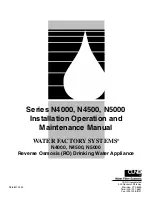
Series MNKA,
acc. to ASME
Page 17
9250-050-en
Revision 11
TM 7903
Edition 07/2010
7.5 Notes on dismantling
All repair and maintenance work is to be performed
by skilled staff using appropriate tools and original
spare parts.
Is the necessary
documentation
available?
Has the pump been taken out of operation,
evacuated and flushed correctly? See also
Section 6.3.
If no new assembly is performed immediately after
dismantling, the plastic and ceramic components in
particular must be stored carefully.
7.5.1 Protective clothing
Even if the pump has been properly
evacuated and flushed, residue of the
medium may still remain in the pump, e.g.
between sealing surfaces or in the bearing seats or in
the can (containment shell) or the can (containment
shell) insert.
Plastic components may absorb medium which
gradually emerges from the material after flushing.
Proper protective clothing is to be worn.
Protective clothing is also to be worn even if only the
bearing pedestal is to be removed. Medium may have
penetrated the lantern chamber through the can
(containment shell).
7.5.2 Magnetic fields
Caution ! Strong magnetic fields !
Risk during dismantling and in the vicinity of
magnetic drives as single parts.
Remove loose parts and other magnetisable metals
from the work bench. They could otherwise be
attracted: Risk of accident!
Place any tools needed at a safe distance.
Keep
electronic
equipment
and
measuring
instruments at a distance. In cases of doubt consult
the equipment manufacturer.
Hold magnetic drives as single parts firmly or secure.
Otherwise they could be attracted, for example, by a
vice: Risk of accident!
People with an artificial pacemaker:
Keep torso
at a minimum distance of
20” (500 mm)
.
Mechanical watches as well as electronic data carriers
and digital watches or pocket calculators:
6” (150 mm) distance.
Data carriers such as credit cards, cheque cards, ID
cards with magnetic strips or magnetic tape:
6” (150 mm) distance
.
7.6 Dismantling
There are 3 possibilities for dismantling:
1. Remove the complete pump from the plant.
2. Remove the complete slide-in unit, i.e. the housing
(casing) remains in the plant.
If the coupling is a spacer-type coupling, the
motor can also remain in the plant.
3. Only remove the drive section, i.e. the pump does
not need to be drained (back pull-out design).
See
Section 5.8
.
The dismantling dimension is 3,78" (96 mm) for group
1 and 5,12" (130 mm) for group 2. See drawing 9220-
00-3006.
Dismantling of the complete pump is described.
Undo the support bracket
183
from the base plate.
The bearing pedestal
330
and support bracket are
one part in bearing pedestal group 1. In bearing
pedestal group 2 the support bracket
183
is
secured with 2 hex. screws
901/2
and tooth lock
washers
936/2
to the bearing pedestal
330
.
Undo housing (casing) screws
901/3
.
Remove housing (casing)
100
.
If the housing (casing)
100
remains in the plant, leave
the housing (casing) gasket
401
in the centering to
protect the housing (casing) sealing surface.
7.6.1 Removing the bearing pedestal
Caution !
Magnetic forces !
Risk of accident !
High magnetic forces can trap fingers and personal
injury.
Axial forces
are produced when the bearing pedestal
330
is pulled out of the lantern
344.
They diminish
again abruptly after it has been pulled out.
The torque of the magnetic drive installed is indicated
on the
name plate
.
Undo screws
901/4
of the lantern/bearing pedestal.
Separate bearing pedestal
330
from the lantern
344
using the jacking screws
908/1
.
Remove flat gasket
400/1
.
7.6.2 Dismantling the bearing pedestal,
long life grease lubrication
Clamp the end of the drive shaft
213
in a vice. Use
protective jaws.
Undo hex. socket screw
914/1
counterclockwise.
Pull off drive magnet assembly
858
.
Remove pump from the vice.
Undo rear bearing cover
361
.
Remove wavy spring washer
953/1
.
Pull out drive shaft
213
with the two radial ball
bearings
321
.














































